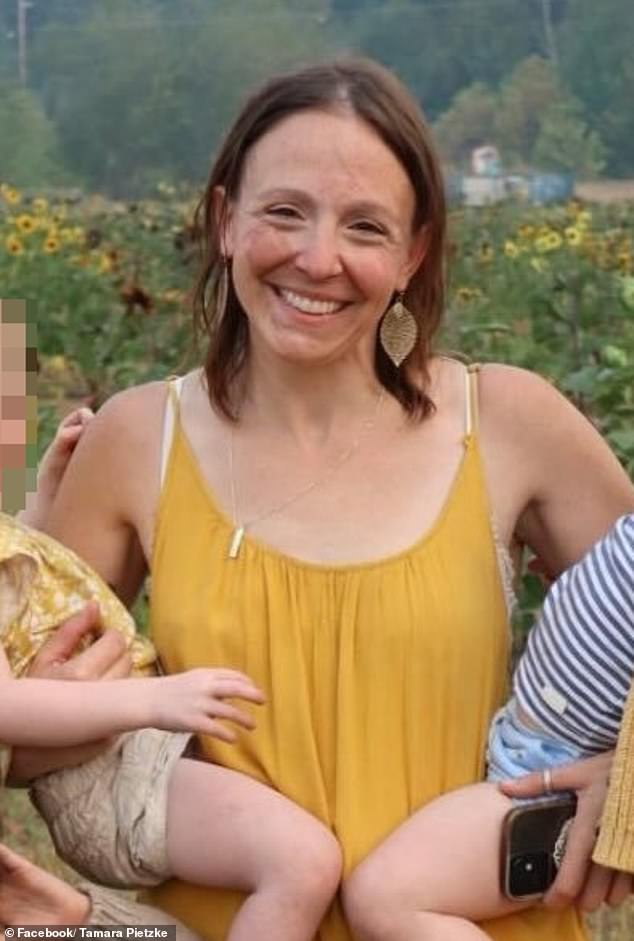Washington therapist reveals how she was told to ‘throw out all her training’ and give ‘gender affirming care’ to abused, autistic, suicidal 13-YEAR-OLD
A Washington therapist has revealed how she was told to “throw away” all her medical training and provide “gender-affirming care” to an abused, autistic and suicidal 13-year-old.
Tamara Pietzke, 36, quit the profession after being reprimanded by her superiors for not immediately agreeing to children’s requests for puberty blockers and gender reassignment surgery.
Some children who wanted to become transgender faced a host of problems, including physical and mental abuse, raging anxiety, depression and suicidal thoughts.
Despite this, she was stopped from quickly signing papers to give life-changing drugs – and when she raised her concerns, she was accused of being biased against trans children, reports The free press.
Tamara Pietzke, 36, is pictured with her own children. She resigned after painful, frustrating instances in which she was reprimanded by her superiors for not promptly acceding to children’s requests for puberty blockers and gender reassignment surgery.
Mother of three Pietzke decided to become a therapist at age 20 and graduated from the University of Washington in 2012 with a master’s degree in social work.
Pietzke has worked with hundreds of clients in Puget Sound, Washington, over the past decade, but she left her job in January because she was told to “throw away” her education if a young person had gender dysphoria.
Instead of properly assessing them, she was told to simply approve their medical transition.
Writing in The Free pressthe therapist revealed, “I got the message from my counselors that when a young person I saw felt uncomfortable about their gender – the diagnostic term is gender dysphoria – I should throw away all my training.
“Regardless of the patient’s history or other mental health issues that might complicate the situation, I simply had to confirm that the patient was transgender, and even approve the beginning of a medical transition.”
Pietzke admitted she was terrified to speak out – “but that fear pales in comparison to my strong belief that we can no longer medicalize youth and cause them potentially irreversible harm.”
She explained that one of her clients, a 13-year-old girl, had a litany of mental health issues. She was abused by her bipolar mother, sexually abused by her cousin, her mother’s boyfriend and by a classmate.
The child suffered from depression, PTSD, anxiety, intermittent explosive disorder and autism – and had previously been hospitalized for talking about suicide.
Pietzke began working with her as a therapist after she expressed ideas about gender dysphoria — and the Mary Bridge Children’s Gender Health Clinic in Washington needed a therapist to sign up before giving the 13-year-old drugs to suppress her periods and boost testosterone. to take.
The therapist recalled to the Free Press how the autistic child could not communicate well with her and began showing Pietzke “extremely sadistic and explicit pornographic videos on her phone” during her first visit.
She said the troubled girl was “hyper fixated” on the porn videos and said they were one of the few genres available to her growing up with her abusive mother.
The girl, who despite being a teenager sucked on pacifiers and watched Teletubbies, recalled how her mother almost killed her sister. She had also just been expelled from school for threatening to blow up the building.

Pictured: Mary Bridge Children’s Gender Health Clinic in Washington
Pietzke said the girl always looked oppressed during their therapy sessions — and never talked to her about her gender dysphoria.
She wrote, “When I asked her how she felt about an upcoming appointment at the gender clinic, she told me she didn’t know she had one.”
Pietzke felt like she had made some progress in opening up the child during the first three sessions, but when she went to plan the fourth with her guardian – her mother’s boyfriend – they wouldn’t let her.
Instead, they demanded that Pietzke write her a letter of recommendation for sex hormone treatment. That is, she would start using testosterone at the age of 13. Such a letter from me begins the process of medical transition for a patient.
The therapist immediately thought this was a bad idea because of the child’s deep, multiple problems. She said: ‘It seemed malpractice to have her abruptly begin a medical gender transition that could quickly bring about permanent changes.’
But Pietzke was reprimanded by her superiors for the concerns she raised. Her manager even removed the child from her care and gave her a new therapist.
The therapist was accused of having “personal biases against trans children” for merely asking questions and being cautious with life-altering medications.
She says: ‘I emailed a program manager in my department at MultiCare and explained my concerns. She wrote back that my client’s trauma history has no influence on whether or not she should receive hormone treatment.’

Pietzke has worked with hundreds of clients in Puget Sound, Washington, over the past decade, but she quit her job in January because her bosses told her to “just affirm” the genders of young trans children. She was told to ‘throw away’ her training if a young person had gender dysphoria – and instead of properly assessing them, she had to approve the medical transition
The email stated: ‘There is no valid, evidence-based, peer-reviewed research that would indicate that gender dysphoria stems from anything other than gender (including trauma, autism, other mental health conditions, etc.)’
“There is the potential to harm a client’s mental health when access to gender-affirming care is limited. Examine (your) personal beliefs and prejudices about trans children.’
Months earlier, Pietzke said she had to attend a mandatory training on gender-affirming care, where she asked the leader “why 70 to 80 percent of female adolescents diagnosed with gender dysphoria have previously had a mental health diagnosis.”
She was reprimanded again by her colleagues for spreading “misinformation about trans children” and “showing hostility toward trans people in direct violation of the Hippocratic Oath.”
Pietzke had another 16-year-old girl as a client, who started saying she no longer felt like a girl during the pandemic. She also had many psychological problems.
The girl started using the pronouns and identified as pansexual, using a gender-neutral name. Her father refused to let her take testosterone, so she didn’t.
All Mary Bridge Children’s Gender Health Clinic could do in the meantime was give her birth control to stop her periods because of her “menstrual dysphoria.”
By early 2023, the girl had decided she was no longer gender neutral, but instead identified as a “wounded male.” She was “xenogender,” a concept that “goes beyond the human understanding of gender.”
She wanted to wear ears and a tail.
The therapist asked her colleagues if there was ever a time when it wasn’t necessary to affirm so freely—and the answer was no.
A colleague said, “It sounds like this isn’t something that’s ‘broken,’ so let’s not try to ‘fix’ it.”
“If someone told me they use a litter box instead of a toilet and they’re happy with it and it’s a fulfilling part of their life, that’s great!”
Pietzke wrote in the Free press: ‘I’m speaking out because nothing will change unless people like me – who know the risks of medicalizing problem young people – blow the whistle.
‘I’m desperate to help my patients. And I think if I don’t speak out, I will have betrayed them.”
